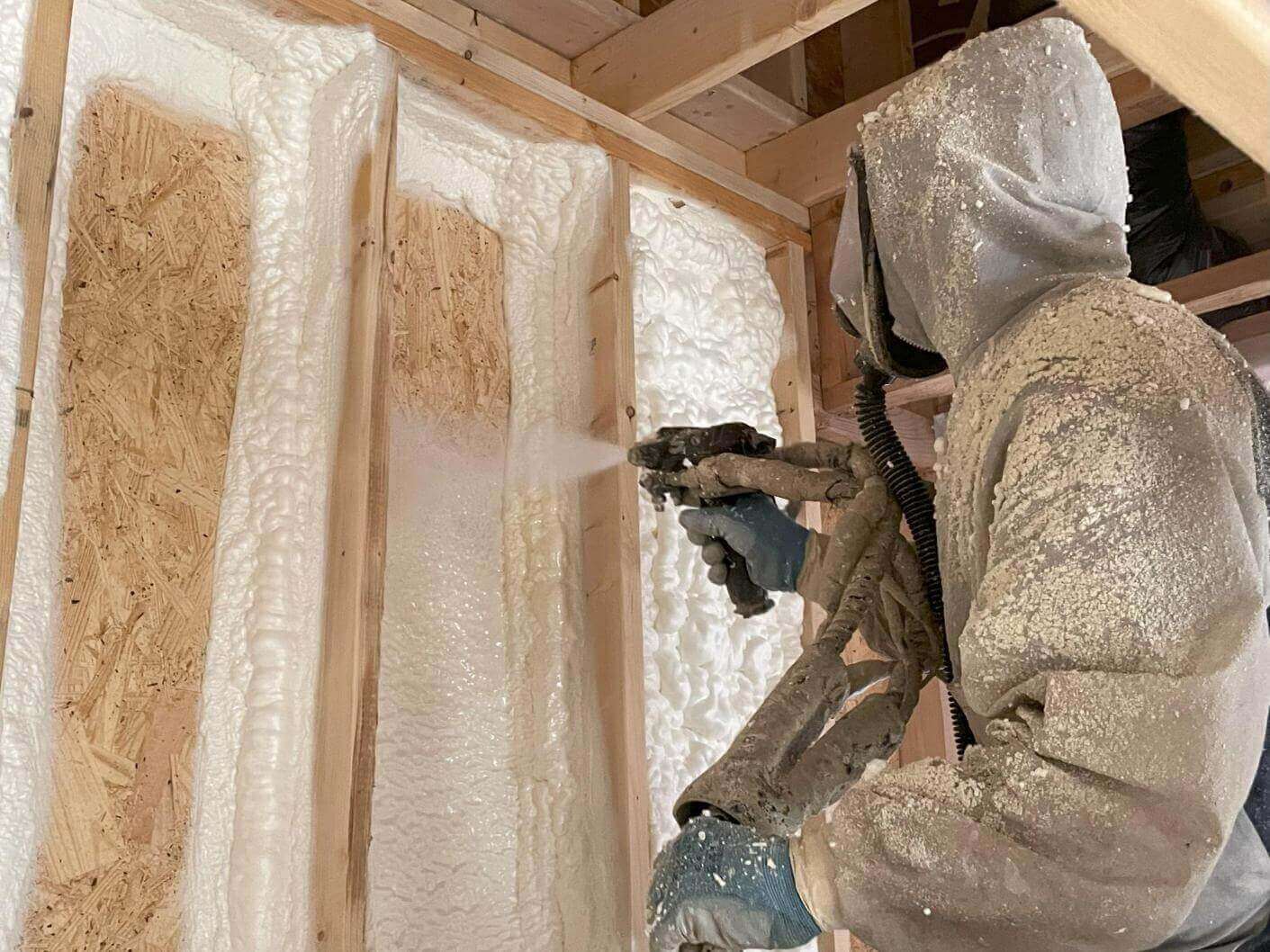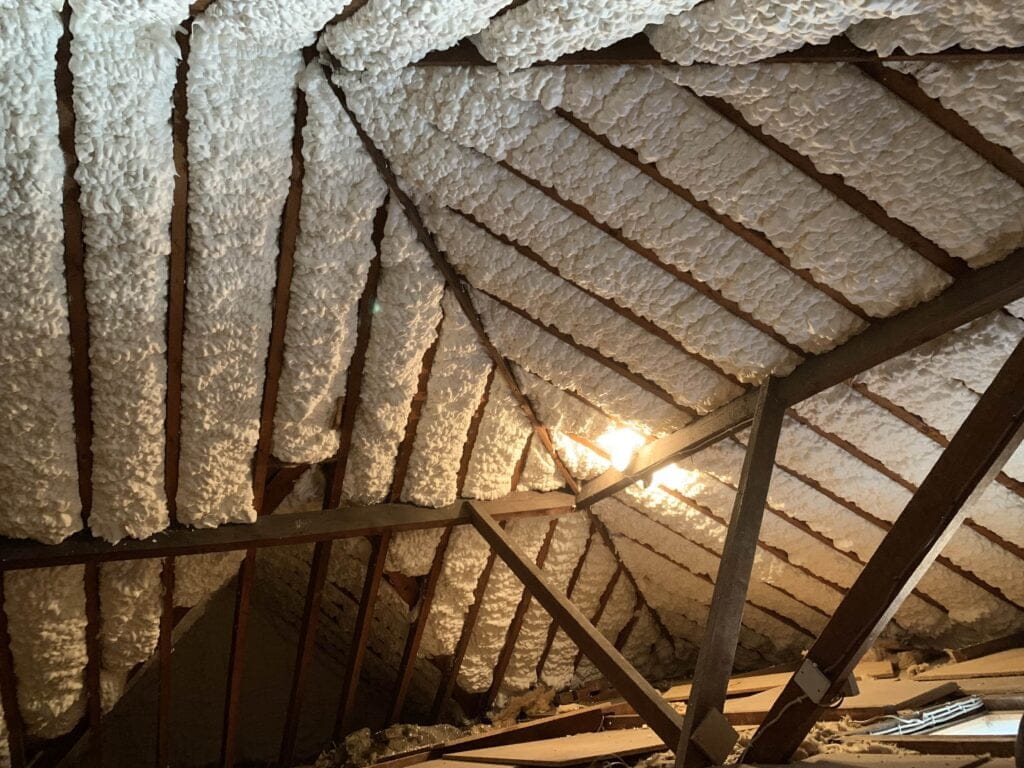How Spray Foam Can Boost Power Performance in your house
How Spray Foam Can Boost Power Performance in your house
Blog Article
Spray Foam: The Ultimate Service for Air Sealing and Insulation
Spray foam insulation has actually become a leading solution for efficient air sealing and thermal insulation, offering a distinct combination of properties that establish it apart from typical methods. Its ability to expand and load voids makes it specifically effective in avoiding air leakage, which can substantially influence energy performance. Comprehending the complete range of its benefits, setup procedures, and contrasts with various other insulation types is critical for making notified choices. As we explore these facets, the implications for both brand-new buildings and retrofits become increasingly significant. What factors should influence your selection?
What Is Spray Foam?
Spray foam is a flexible insulation material that integrates the principles of air sealing and thermal resistance to enhance energy efficiency in buildings. Composed primarily of polyurethane or various other comparable substances, spray foam is applied as a fluid that increases upon call with surfaces, producing a strong, continual layer of insulation. This distinct building enables it to fill up gaps, fractures, and voids that conventional insulation products may overlook, giving an exceptional air seal.
There are two primary sorts of spray foam: open-cell and closed-cell. Open-cell spray foam is lighter and a lot more adaptable, using outstanding audio absorption and a reduced R-value per inch - Spray Foam. On the other hand, closed-cell spray foam is denser, giving a higher R-value, dampness resistance, and added architectural integrity to constructing elements
The application process usually includes specialized equipment, making certain a smooth application that abides by different substrates, consisting of timber, steel, and concrete. This versatility makes spray foam ideal for both brand-new building and constructions and retrofitting existing frameworks. Its ability to produce an impermeable barrier considerably adds to lowering energy usage and enhancing indoor air quality, consequently making it a preferred selection amongst home owners and contractors alike.
Advantages of Spray Foam Insulation
Among one of the most considerable benefits of spray foam insulation is its extraordinary capacity to develop a constant air obstacle, which properly lessens power loss. Unlike traditional insulation products, spray foam broadens to fill fractures and gaps, making certain that air leakage is dramatically reduced. This particular not just boosts energy effectiveness however also brings about decrease utility costs with time.
Additionally, spray foam insulation gives superior thermal resistance, adding to a more steady indoor atmosphere. Its high R-value per inch enables effective insulation in confined rooms, making it perfect for attics, walls, and crawl spaces. The moisture-resistant properties of spray foam aid avoid mold and mold growth, advertising healthier living problems.
One more vital advantage of spray foam insulation is its sound-dampening qualities (Spray Foam). It efficiently reduces sound transmission between spaces, creating a quieter and more comfy home environment. The longevity of spray foam additionally sticks out, as it does not sag or resolve over time, maintaining its performance throughout its life-span
Exactly How Spray Foam Functions
Comprehending just how spray foam insulation works is important for valuing its effectiveness in air sealing and thermal resistance. Spray foam insulation consists of two main elements: isocyanate and polyol resin. When these elements are combined, they undertake a chain reaction that causes the product to expand quickly, developing a dense foam that fills spaces, cavities, and fractures.
As the foam broadens, it complies with surface areas, developing an impermeable seal that considerably lowers air seepage. This characteristic makes spray foam insulation very reliable at protecting against drafts and dampness infiltration, which can lead to energy loss and damages you can try this out over time. Additionally, the closed-cell variation of spray foam supplies premium thermal resistance due to its inflexible structure, efficiently reducing warmth transfer.
The special properties of spray foam allow it to comply with irregular surfaces, guaranteeing detailed coverage and a seamless obstacle. Consequently, spray foam insulation not only enhances energy performance but additionally adds to improved indoor air top quality by lowering the build-up of irritants and pollutants. Inevitably, comprehending the auto mechanics behind spray foam highlights its role as a remarkable selection for insulation and air sealing in both property and commercial applications.
Setup Refine Summary

Prior to installment, the area has to be sufficiently cleansed and prepped, ensuring that surfaces are without debris, dust, and dampness. Since impurities can compromise attachment and total performance, this step is critical. Once the area is prepared, the application includes blending both elements of the spray foam, which broadens upon contact and loads voids successfully.
Trained specialists ought to carry out the installation, utilizing specialized equipment to make sure uniform coverage and optimal thickness. Security preventative measures, consisting of wearing protective gear and making sure appropriate ventilation, are important throughout this procedure. After application, the foam typically cures promptly, creating a strong obstacle that improves energy performance.
Contrasting Spray Foam to Standard Insulation
When assessing insulation options, spray foam insulation stands out in comparison to traditional products such as fiberglass and cellulose. Unlike fiberglass and cellulose, which can allow air infiltration, spray foam expands upon application, filling voids and gaps to develop an impermeable seal.
Furthermore, spray foam provides a higher R-value per inch than typical insulation types, offering even more efficient thermal resistance in a thinner profile. This characteristic is particularly useful precede with restricted dental caries deepness. In addition, spray foam is resistant to dampness and mold and mildew development, which can be a considerable interest in cellulose and fiberglass, specifically in moist settings.
Nonetheless, spray foam insulation typically lugs a higher upfront price than its conventional counterparts. Property owners have to weigh this preliminary financial investment against long-lasting click resources energy savings and efficiency advantages. Ultimately, while both insulation types serve their purpose, spray foam emerges as a more sophisticated remedy for contemporary insulation needs, particularly in terms of air sealing and thermal effectiveness.

Final Thought
In summary, spray foam insulation stands for a highly efficient option for accomplishing optimal air sealing and thermal resistance. Its distinct residential or commercial properties, consisting of dampness resistance and sound dampening, make it suitable for numerous applications in both new building and constructions and retrofitting jobs (Spray Foam). The initial prices might be higher compared to conventional insulation materials, the lasting advantages, such as considerable power savings and improved interior air high quality, warrant the investment and underscore its value in contemporary structure practices.
Spray foam insulation has emerged as a leading option for effective air securing and thermal insulation, supplying a distinct combination of residential or commercial properties that establish it apart from standard techniques.Spray foam is a flexible insulation product that combines the principles of air sealing and thermal resistance to improve energy effectiveness in buildings.When assessing insulation choices, spray foam insulation stands out in contrast to traditional products such as fiberglass and cellulose. Eventually, while both insulation kinds offer their purpose, spray foam emerges as a more sophisticated remedy for modern-day insulation requirements, especially in terms of air securing and thermal efficiency.
In summary, spray foam insulation stands for an extremely reliable remedy for achieving ideal air sealing and thermal resistance.
Report this page